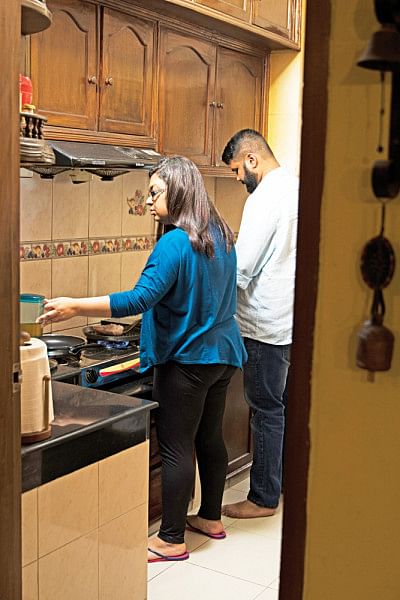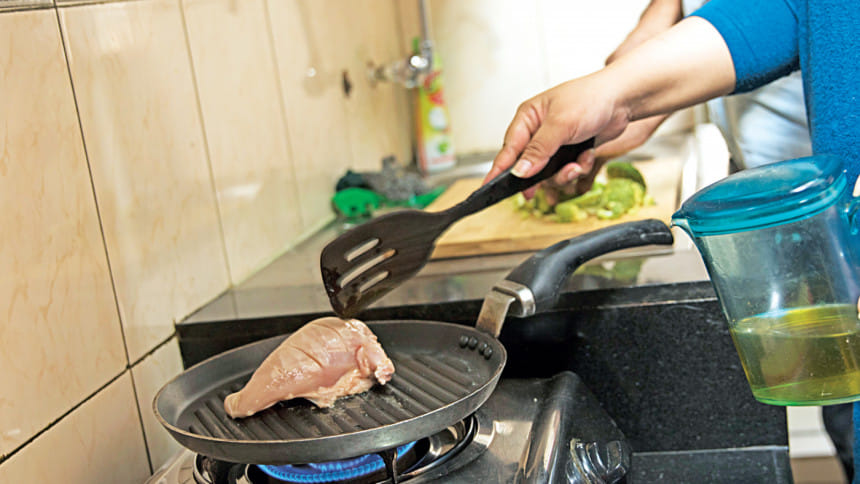Homecooked meals: Why they make sense in today’s society

The argument for home cooking is perhaps one of the most observable phenomena of modern middle-class lives, which just keep getting busier. Many of us can still recall childhoods when anything from the store or bakery was quite a treat. Nowadays, however, as demands on our time take so many shapes, the concept of home cooking vs store bought and the benefits vs convenience dispute have become more pronounced. Add to that the lack of transparency in industrial food production practices, it is no surprise that celebrities, health gurus, and lifestyle influencers are all advocating for homecooked food.
Does that make the alternative a horrible choice?
On the contrary. Readymade, frozen, pre-processed and all the in-between versions of food are here to stay, and thankfully so, especially from the perspectives of busy professionals and mums with little children!
So, what is the fuss about home cooking? It simply refers to the preparation of food in a home setting, something that has been happening over household hearths for thousands of years, as opposed to a commercial or professional kitchen. Today, it can refer to a meal prepped from scratch, or cooked with partially processed and some raw items that require more skills than just knowing the ingredients or recipe! Cooking techniques like stir-frying, baking, grilling, sautéing, and making mashed preparations are just a few mainstream skills that chefs at home are masters of.
Now, why is home cooking or homemade food recommended? For a variety of reasons, actually. Homecooked food is healthy, as preparing meals at home allows one to control the ingredients, which can help to make healthier choices. Home-cooked meals also tend to be lower in salt, and have no processed sugars or unhealthy fats that restaurant or pre-packaged meals may contain. Moreover, cooking at home can be less expensive than eating out or buying pre-prepared meals. The cost benefits can be reaped even more so with some planning and bulk buying of the pantry basics.
For those of us with environmental concerns on our minds, home cooking provides an opportunity to reduce our carbon footprint and reduce waste like packaging, and also food wastage when pre-packaged food is not sold and hits its expiration date. Plus, with home cooking, not only is the preparation process more efficient but also allows leftovers to be utilised.

A damning argument that can be made against store bought food items is the sheer amount of uncertainty when it comes to its ingredients. We have all come across various scandalous news about companies substituting real/natural ingredients or chemicals with downright pollutants to save a buck. There have been already been plenty of cases of such in our country, some of which made nationwide news.
There are also concerns about restaurant-bought food. It's no secret that many eateries have very unsanitary kitchens, which leads to contaminated food, as well as the presence of foreign debris like hair fragments or even something as dangerous as a nail or other metal/plastic pieces, or even the presence of insects like cockroaches, ants, etc.
But is healthy food the only concern? Not nearly, its preparation, and consumption form an integral part of our human existence. We associate food with sustenance, yes, but also joy, comfort, celebrations, and most of all perhaps, home! Our preferences for life are set up around the food on the table at home, and by extension, from the kitchen. Cooking and sharing meals at home can bring families and friends together and strengthen relationships. No wonder winter barbeques are so fun!
On a more personal level, cooking at home can be a very interesting and satisfying hobby, as well as a source of pride. Have you relished seeing family and friends indulging in something delicious you cooked yourself? Feels amazingly gratifying, surely. Moreover, food is also a strong connection to individual cultural roots, and home cooking allows individuals and families to preserve traditional dishes and cultural cuisines that may not be as widely available in restaurants or pre-packaged meals.
Cooking or prep time can also serve as an opportunity to relax and unwind, and enjoy some music or that favourite podcast in the background.

You could argue that store-bought food features a variety that home cooking may not match. But, does home cooking need to be one-dimensional or boring? Not at all. and if learning new skills feels exciting, cooking at home is the perfect way to enjoy that, by practicing and perfecting knife skills, or trying out all new recipes. You could also spice up your routine with fun names and themes like Meatless Monday, Taco Tuesday, or Seafood Saturday to keep things interesting and bring variety to the home-cooked meal. One can also create intra-friends cooking competitions. Just think of all the possibilities with that one.
Family members nowadays rarely get to spend time with each other due to different schedules. But if a tradition can be set in a home to ensure that one home-cooked meal of the day is shared by everyone around the table at the same time, it makes for improved bonds and relationships, and the preservation of family values.
Eating together also allows family members to talk and share their thoughts and experiences, which helps to strengthen family bonds and improve communication while ensuring nutritious meals. Eating home-cooked meals together can help to ensure that family members are eating a healthy, balanced diet, as they are healthier than take-out or fast food. Eating together nurtures an increased sense of belonging, and children who eat dinner with their families regularly tend to have better academic performance. Cooking at home together also opens up children to positive role models, and studies have found that people who eat together as a family tend to be more satisfied with their lives, and feel more connected to their communities.
So, next weekend, try and shop for the next 7 days of home cooking, and explore the benefits for yourself!
By Sania Aiman
Photo: LS Archive/Sazzad Ibne Sayed/Sharmin Rahman and Emran Khan

 For all latest news, follow The Daily Star's Google News channel.
For all latest news, follow The Daily Star's Google News channel. 



Comments